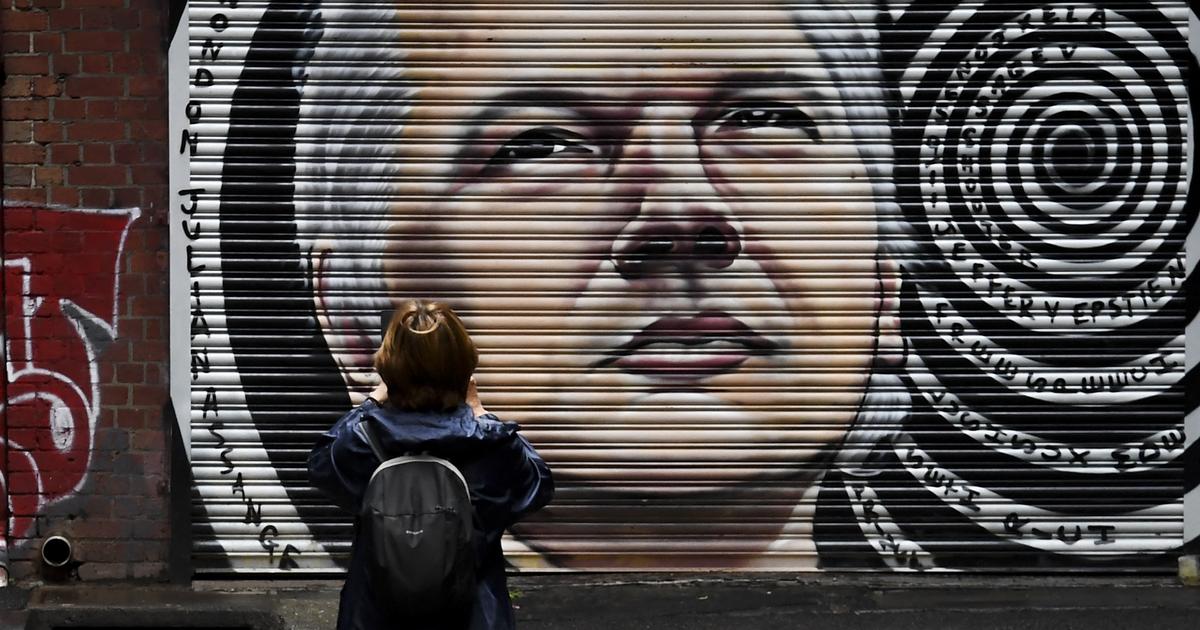Enlarge image
Protest for Assange in London, January 2021
Photo: NEIL HALL / EPA-EFE / Shutterstock
The persecution of Julian Assange affects us all.
Regardless of whether you call him a journalist or not: "In the USA he would be punished for his contribution to media reports of great public interest, which would have serious consequences for press freedom around the world." This is what Christian Mihr, managing director of "Reporter." without borders «(ROG) in Germany.
And without an independent press, we can forget about democracy.
If the United States can get away with putting an Australian who worked on European soil behind bars, then a new level of threat to press freedom has been reached.
According to the ROG, Assange, who has now been stripped of his Ecuadorian citizenship, would be the first media worker to be investigated under an espionage law.
He faces a total of 175 years in prison if found guilty on all 18 counts.
The allegations are hard to hold.
This became evident once more when it became known that an alleged key witness had invented allegations.
In reality, this is what it is about: Julian Assange uncovered, among other things, the brutal US actions in Afghanistan and Iraq through his publications on the WikiLeaks disclosure platform.
He should atone for this - as a deterrent for anyone who might come up with similar ideas.
It's a shame and it upsets a lot of people, and rightly so.
In many countries there are now "Free Assange" groups that educate people and hold vigils - most recently on the occasion of his 50th birthday.
It was his third in the maximum security prison Belmarsh in London, where he is threatened with extradition to the USA.
At the beginning of the year a court refused the extradition, but allowed the US government to appeal two weeks ago.
It is not yet clear when the final decision will be made.
The only thing that is clear is that Assange needs even more support until then.
Much has already happened:
Dozens of media, human rights and other organizations speak out against extradition, including Amnesty International, Human Rights Watch, the authors' association PEN, the Council of Europe's Commissioner for Human Rights and the Commissioner for Freedom of the Media at the Organization for Security and Cooperation in Europe (OSCE).
120 well-known German personalities from politics, media, art and culture, including former federal ministers, wrote to Chancellor Angela Merkel in an open letter
Celebrities like the actress Pamela Anderson, the artist Ai Weiwei and the director Oliver Stone call for solidarity with the Australian.
Cross-party parliamentary groups from Germany and other countries have issued statements in support of him.
But all of that is not enough.
We in the media need to cover more of the case, just as we covered the WikiLeaks revelations back then.
We as a society need to put more pressure on politics because we all benefit from such information.
Because they show us what is going on behind the scenes in many cases.
The matter is problematic for another reason: it enables governments in autocratic countries such as Azerbaijan to refer to the way they deal with Julian Assange when they are asked about their own human rights violations.
This enables them to expose the hypocrisy of "the" West.
As in the case of the whistleblower Edward Snowden, Germany, which is seen in many places as a role model in matters of democracy and the rule of law, unfortunately presents a sad picture.
For years, the federal government has been silent on dealing with Assange, who, according to UN representative Nils Melzer and more than 200 men and women from medicine and psychology, was subjected to "psychological torture".
On Merkel's trip to the USA in mid-July, his fate was not an issue, at least not officially.
Shortly beforehand, your spokesman expressed himself in a sentence that has represented the position of the Federal Government in various versions for years: "We have full confidence that the rule of law principles and guarantees will be guaranteed in Great Britain."
Germany has to do more
It has long been documented that this is not true.
"Reporters Without Borders" has shown, for example, that process observers were hindered and reporting was restricted.
Internal documents published in 2020 also show that the Federal Foreign Office claimed to have no findings of its own, but actually sent personnel to observe the trial, received reports on the case from all over the world and considered Assange's descriptions of his poor detention conditions to be "entirely conceivable".
As early as 2016, when he was living in the Ecuadorian embassy in London, a group of UN experts came to the conclusion that his stay there was tantamount to "arbitrary" imprisonment by Great Britain and Sweden. The Wikileaks founder fled to the diplomatic mission after the Swedish authorities suspected him of rape on the basis of interrogation protocols that the UN Special Rapporteur on Torture Melzer said had been manipulated. He calls Assange's treatment one of the greatest judicial scandals of all time.
It's been four years since another scandal hit the German public. When the journalist Deniz Yücel was arrested in Turkey, it was said everywhere in the country: #FreeDeniz. He was a political prisoner like Julian Assange is. That's why it has to be: #FreeAssange.














